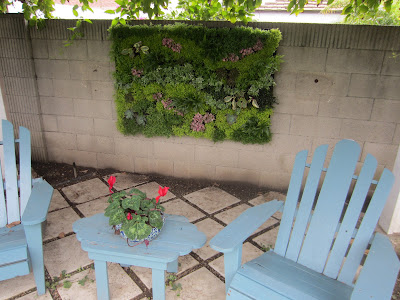Just completed my first vertical gardening project in which I utilized the Bright Green USA modular system, and I must say, I will only use this system for large vertical gardens from now on. The solution consists of 20" X 20" modules, each containing 45 slanted cells. Basically, there is no real limit to how many modules you can combine, I started with a modest installation that is 60" wide X 40" deep. I have seen pictures of entire sides of commercial buildings and homes covered in a mosaic of plants using this system.
I installed a drip irrigation system for this living wall, and everything about this project exceeded my expectations. I am going to do something really large scale with this system, soon! I wish I would have made this installation larger, but there's always the next project.... Here's a detail shot.
This living wall is on a North-facing wall, under an arbor in complete shade. The plantings primarily consist of ferns, succulents, ivy, selaginella, ficus and "splash."
I simply mounted 2 X 4s onto the block wall, then secured the mounting hardware which supports the panels.
Planting in progress, giving you an idea of the form of the modules, and the slanted cells.
Another Green World
Tending 12,000 square feet of land in Sunset Climate Zone 23
Saturday, December 22, 2012
Wednesday, November 7, 2012
Fall Mosaic
Just a random few square feet of garden here in Autumn, including the flowering Chilean native succulent Calandrinia Grandiflora, California natives Ceanothus and Arctostaphylos (manzanita) Emerald Carpet, a sedum or two and numerous hybrid varieties of Euphorbia displaying their version of fall color.
2012 - A great year for gardening.
Since it is now Fall pruning/planting season, here's a few photos capturing some of the 2012 Spring and Summer highlights from my backyard garden:
Enjoying the look, and tastes, of this edible herb border.
It's been a great year for roses. Very disease free. This is David Austin "Mary Rose".
An "Anna" Apple
These little guys have been everywhere.
Friday, November 2, 2012
Two-Sided Hanging Vertical Panel
 |
| Side 1A |
 | |||||||||||
| Side 1B |
This 30" X 20" hanging two-sided vertical panel needed to be designed and built so that it would be 1) strong, 2) light, 3) thin and 4) not susceptible to soil shifting/compaction
Frame is built with 2 1/2" board using metal braces on each corner. I inserted a center divider to create two 15" X 20" compartments which would help reduce issues with soil shifting/compaction. Then, installed 1/4" mesh to one side, nailed on the decorative outer frame, then painted entire frame. I then very tightly-packed a "sandwich" of moss - soil - moss, figuring this would further reduce soil volume, lessen the overall weight and increase water retention. Then, I flipped the panel over, installed the 1/4" mesh and decorative frame on the other side, and finished the painting.
Planting in-progress on one side.
After planting one side, I hung the panel for a week or so, then took it down and planted the other side, keeping the panel in a standing position while planting.
Here is a detail view of one side. Most plants are Sempervivum, with a number of Echeveria "Dark Prince" mixed in. I'm using an extremely fine spray hose diffuser to water this panel.
Tuesday, October 23, 2012
Vertical Succulent Panels - Part 2
A 2 ft. X 3 ft. panel, , the first I built, with very little prior research into the various "dos and don'ts." This is mounted on an East-facing stucco wall that gets several hours of very direct morning sun. Although the panel turned out very nice, I definitely learned a few things for subsequent projects relative to managing the size, weight, irrigation, soil compaction, exposure, etc.
...and here is a detail view.
...and here is a detail view.
Monday, October 22, 2012
Hanging Baskets with Succulents
I line the hanging basket with 1/4" wire mesh, and pack it very tightly with cactus mix.
Then, flip the basket upside-down onto plywood and plant with succulent cuttings.
Water frequently and keep upside-down in a shady spot. When ready (either cuttings are securely packed, or rooted, or loose plants are secured with floral pins), flip the basket, hang it and plant the top. Water the baskets as the soil dries.
Then, flip the basket upside-down onto plywood and plant with succulent cuttings.
Water frequently and keep upside-down in a shady spot. When ready (either cuttings are securely packed, or rooted, or loose plants are secured with floral pins), flip the basket, hang it and plant the top. Water the baskets as the soil dries.
Thursday, October 18, 2012
Vertical Gardening - Triptych
Three 2 ft. X 2 ft. vertical succulent boxes hanging on a North-facing wall. This location gets about two to three hours of indirect morning sunlight. The boxes are removed from the wall for hose watering, using a diffuser nozzle, about every 5 days in summer, less frequently in cooler months. For panels like these, built using a wood frame - soil - wire mesh construction, this size, 2' X 2', is about as large as you can go due to practicality of watering and soil compaction issues that will hamper the sustainability of larger panels.
Subscribe to:
Comments (Atom)




























